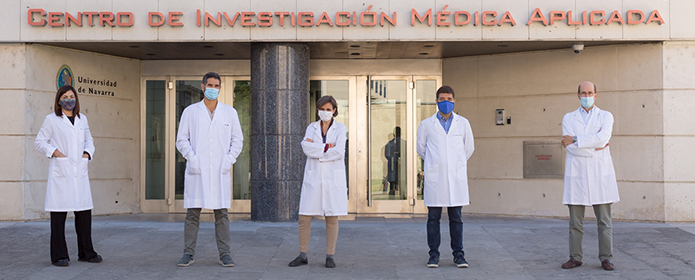The AECC selects six projects from Cima University of Navarra in its 2020 call for grants
These include innovative ideas for the treatment of sarcomas, lung, liver and digestive system cancer, as well as new immunotherapies and a cardiotoxicity meter for anti-tumor treatment.

The association Spanish Agency Against Cancer (AECC) has selected six projects from the Cima University of Navarra, among the 107 ideas awarded in its call for 2020 grants. These are innovative ideas for the treatment of metastasis, lung, liver and digestive system cancer, new immunotherapies and a cardiotoxicity meter for anti-tumor treatment.
Dr. Fernando Lecanda, researcher of the Solid Tumor Program at Cima, coordinates a project focused on development of new treatments for sarcomas, rare tumors that account for about 20% of childhood cancer. "We have developed a new platform of genetically modified sarcoma models that more closely mimic human sarcomas. This milestone provides a solid basis for studying the efficacy of new combinatorial strategies of immunotherapy and radiotherapy, with the advantage of anticipating possible adverse side effects. Therefore, for patients, it would represent an advance B with respect to current treatments," suggests Dr. Lecanda.
On the other hand, the AECC is funding a project that presents a novel therapeutic proposal for lung cancer. "Mutations in the KRAS oncogene play a crucial role in the development of this disease and are associated with a worse response to chemotherapy. Our project proposes a novel combination of drugs aimed at treating KRAS-mutated adenocarcinoma," explains Dr. Silve Vicent, researcher of Cima and manager of this study. Since these drugs are already approved for clinical use in other types of cancer, this proposal could rapidly translate the results of the research to clinical application and change the therapeutic paradigm in a group B of lung cancer patients.
Both initiatives are part of the call "Proyectos Estratégicos AECC" (AECC Strategic Projects), endowed with 300,000 euros for three years.
Advances in liver and digestive cancerAnother of the projects selected in the 2020 call for proposals delves into the knowledge of a series of essential mechanisms in the development of liver (hepatocarcinoma and hepatoblastoma) and digestive tumors, and in pancreatic cancer. "These are tumors that are highly resistant to conventional chemotherapies. Therefore, it is necessary to implement novel and effective strategies to treat these aggressive cancers. In our project we propose new therapeutic targets based on epigenetic mechanisms and the development of innovative drugs that interfere with such mechanisms, which are vital not only in tumor cells but also in their environment", explains the Dr. Maite García Fernández de Barrena, M.D.researcher at the Hepatology Programme of Cima and coordinator of project "LAB AECC", which has received 300,000 euros for three years.
Likewise, the Dr. Puri Fortesresearcher at the Gene Therapy and Regulation of Gene Expression Program of Cima, leads a project that analyzes the role of molecules whose expression, under normal conditions, is restricted to testicular tissue and that could become targets for the development of new therapies against liver cancer.
Recently, the function of certain molecules, called long non-coding RNAs (lncRNAs), has been described as essential for tumor growth. "Our previous work has shown that many tumors produce lncRNAs that are normally synthesized only in healthy testis. The testis has a high level of growth and shares several characteristics with tumor cells, but in a controlled manner. We think that when testis lncRNAs are produced in tumors, they transfer that ability to grow, but control is lost. In this context, we are going to analyze the impact of lncRNAs that are normally expressed in healthy testis on tumor growth and cancer. Our strategy, focused mainly on liver cancer, could also be applied to the treatment of other tumors," says Dr. Fortes.
The fifth project selected proposes the design of pluripotent stem cell chips for the development of cancer therapies and to determine cardiotoxicity associated with antitumor treatment. As explained by Dr. Manuel M. Mazoresearcher of the Regenerative Medicine Programme of Cima, "the emergence of human pluripotent stem cells has opened the door to the generation of cardiac cells identical to those of the patients themselves, which are capable of reproducing the patient's response to drugs. Our microtechnology and stem cell strategy aims to lay the groundwork instructions to create a device capable of determining whether a compound is cardiotoxic. It will also make it possible to detect the presence of cardiotoxicity in patient samples".
The initiatives of Drs. Fortes and Mazo fall into the category "Seed Ideas", aimed at converting innovative and original ideas into solid projects at research in cancer. They have an endowment of 20,000 euros for two years.
Finally, within the call "Junior Clinician 2020", aimed at promoting research in clinical professionals, the AECC has selected a project from Cima on new immunotherapies against cancer.
Immunotherapy has revolutionized cancer treatment. However, less than 50% of patients respond to treatment. Therefore, there is a need to develop new immunotherapy strategies.
"We propose to validate the employment of humanized and optimized mouse models in cancer immunotherapy. We have started to obtain patient samples to graft them onto animal models. This will allow us to evaluate whether they respond in the same way to the treatments," explains Dr. Iñaki Eguren, researcher principal of project, which is endowed with 60,000 euros for two years.
